Playing a match in front of what should have been a passionate home crowd, and carrying the burden of expectations on his shoulders, Japanese star Kento Momota let the occasion get the better of him and in failing to produce his best, the world #1 not only made an early exit but has possibly bottled what could have been his best chance of winning an Olympic gold medal.
By Bikash Mohapatra. Photos: Badmintonphoto
The men’s singles competition in badminton at the Tokyo Olympics ensured both a surprise and a shock. To witness Heo Kwang-hee move directly from the group stage to the quarter-finals was a surprise. The 25-year-old had hitherto achieved little of significance to merit attention.
But by topping Group A, the Korean guaranteed himself a bye through the Round of 16, and therefore a direct spot in the last eight. And to secure top spot in his group, Heo shocked the pre-tournament favourite. He beat Kento Momota. Believe it or faint!
Coming into the tournament there were few who had doubts that Momota would guarantee the host nation a gold medal. The fact he had played little in recent times notwithstanding, the 26-year-old was the absolute favourite to win the title. Besides the fact that Japan is hosting the Games, there was also an emotional angle involved.
Momota was also among the favourites leading up to the Rio Olympics in 2016. However, the fact that he frequented an illegal casino in Tokyo was enough to earn him a 12-month suspension, and expulsion from Japanese contingent to Brazil. Instead of being a leader of the group the player was left to regret “betraying everyone’s expectations”.
To his credit the left-hander came back well from the ignominious incident, having a superlative season in 2018 and a spectacular one the following year – losing just six of the 73 matches he played that year. In fact Momota’s record 11 titles in 2019 earned him a place in the prestigious Guinness Book of World Records. The year 2020 began with the Malaysian Masters title before a freak accident, en route to the Kuala Lumpur airport, left him with a broken nose and many scars – both physical and mental. The Japanese player even had doubts if he would play again.
With a pandemic causing havoc the world over post-March 2020 the Badminton World Federation (BWF) was forced to cancel most tournaments, and reschedule a few. Besides, the Tokyo Games were also postponed for 12 months, giving Momota ample time to not just recover physically but also to regain his mental composure, something the player himself admitted.
“When the Games were postponed by a year and then it was on the news that they might be cancelled, I thought a lot about how I might not be able to play at the Olympics,” Momota told reporters, adding, “But a lot of people have worked hard to put the competition on, and I’ve just tried to block out the noise and put everything into the things I can control.”
While the rescheduled BWF competitions for 2020 resumed in a bio-bubble in Bangkok this January there was again a notable absentee. Ahead of his departure to the Thai capital Momota tested positive for COVID-19, and that put paid to his prospects of returning to competition at the back-to-back Super 1000 tournaments, followed by the BWF World Tour Finals.
When Momota did return to court, at the All England Championships in March, his comeback was cut short in the quarter-finals by Lee Zii Jia of Malaysia, the eventual champion. The three matches he played in Arena Birmingham would be the only ones Momota played this year, ahead of the Tokyo Games. Yet, his all-round game, domination in recent years and the stranglehold he has over his major opponents meant the 26-year-old was the firm favourite for the gold medal. The player himself oozed confidence, saying his physical fitness has improved “little by little” and that he “feels really good” going into the tournament.
The men’s singles draw in Tokyo was expectedly easy for the tournament’s top seed. The home favourite just had to win two easy group matches, and top his group, to ensure he skipped the Round of 16 altogether and secure a direct place in the quarter-final. Momota had little problem in his opening match, against American Timothy Lam. There was albeit a shocking result lying in the wait.
Heo Kwang Hee, ranked #38 in the world, is also making his Olympic debut. There were absolutely zero expectations from him, and consequently no pressure. He was the proverbial underdog and had nothing to lose – Momota had won all their three previous matches. It’s a combination of all these factors that sent nerves out of the window and ensured the Korean gave his best shot. In the final analysis it was enough to cause the shock of the tournament.
Momota, the home favourite, had flattered to deceive. He had belied his ranking, and his status. He had failed to get out of the group stages. He had been left to rue another Olympic disappointment.
“I had so much support from everyone and a lot of people expected me to win, but I didn’t make it tonight. I am very sorry for them,” Momota told reporters following his exit.
“In the first game I felt OK. But after the opponent reached 11, I couldn’t recover myself and couldn’t motivate myself after that,” the world #1 continued, adding, “My condition was fine.
“But I was just not good enough tonight.”
To say the 26-year-old was left disappointed at the end will be an understatement. Momota’s exit meant there were no firm favourites thereafter. It was an open field, with the one taking the most advantage also ensuring him of the gold medal.
For Momota suffice to say it is an opportunity lost. Winning in front of his home fans would have been something. As things stand it has been two Olympics, the favourite’s status two times over and eventually, a double disappointment.
Gold medals from the Olympics – and also the Asian Games – are obviously the only major things missing from the Japanese player’s otherwise impressive resume. The manner in which he has dominated proceedings when fit, and not embroiled in some controversy, is something few players can boast of. So much so that for a player of his stature anything other than the gold medal would be considered as a major disappointment. That said, the Mino-born star would need luck to get him a medal of any colour now.
By the time the next Olympics happen in Paris, Momota will be almost 30 – an older age for a badminton player. His talent notwithstanding, the fitness levels won’t be the same. Not to forget the existing opposition will have added to their oeuvre in three years time, and there could be a newer lot of opponents to contend with as well.
Besides, having multiple cracks at the Olympics, with intent to win gold, ain’t easy. Only two players, Lin Dan and Lee Chong Wei, have thus far managed to mount multiple challenges to win the Olympic gold medal. While the Chinese legend grasped two of his chances, his rival from Malaysia had to contend with three successive ‘final’ disappointments. While it is preposterous to suggest that Momota won’t have another realistic chance to pocket that elusive yellow metal, simply put it will be difficult.
Truth is a bitter pill, but it has to be swallowed nonetheless. The truth is Momota most certainly succumbed to the pressure of expectations, and has probably bottled what could have been his best chance. For once, the once-in-a-generation player got overwhelmed and let the occasion get the better of him, something he was honest enough to admit later.
“It’s really difficult to go about things the way you usually do when you’re playing on this stage (Olympics),” Momota told reporters. “A lot of things happened, but thanks to the efforts of many people I got to feel the tension and experience what it’s like to play at an Olympics. I really appreciate that.”
If the Japanese star has another shot at redemption and manage to win an Olympic gold medal or any medal for that matter remains to be seen.
![Is Momota destined to miss out on Olympic gold? Playing a match in front of what should have been a passionate home crowd, and carrying the burden of expectations on his shoulders, Japanese star Kento Momota let the occasion […]](http://www.badzine.net/wp-content/uploads/ngg_featured/b_20210728_2147_OlympicGames2020_BPST08696_rotator.jpg)
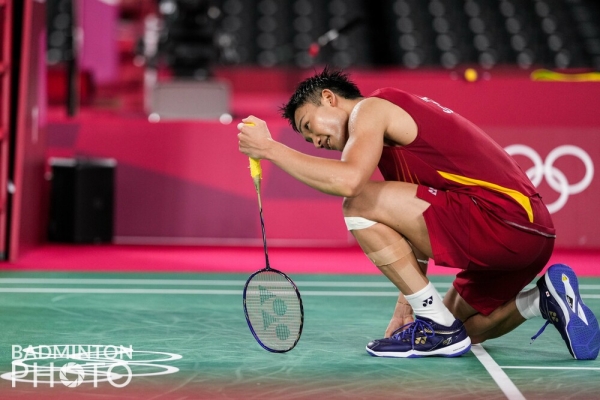
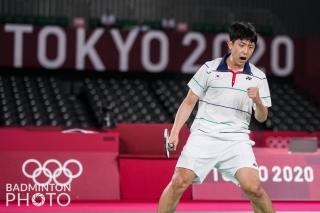
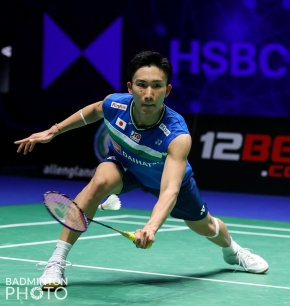
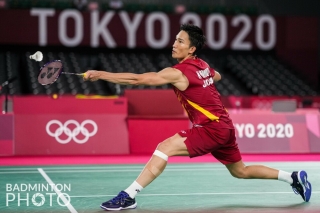
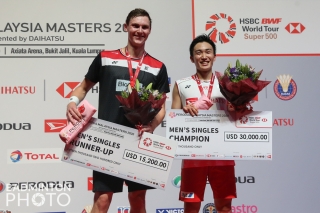
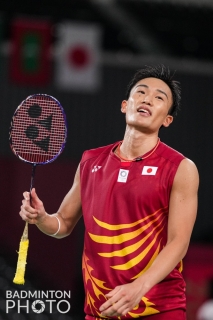

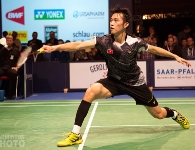
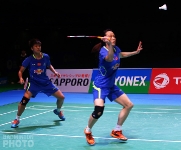


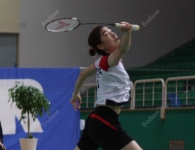
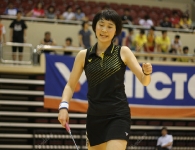
Momota used to be so strong. I truly hope he will be able to come back stronger!